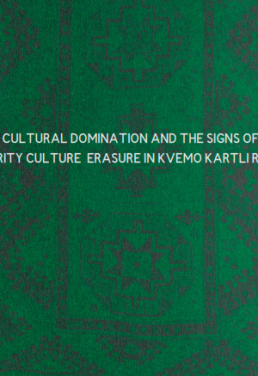საერთო ცხელი ხაზი +995 577 07 05 63


Data obtained in the course of this research reflects the complex picture of cultural dominance in Kvemo Kartli. Based on this material, we can talk about a simultaneously targeted and thoughtless state policy, which adversely affects the daily life of the Azerbaijani community.
Interviews conducted with representatives of the Azerbaijani community share a common narrative of anticipating recognition, expressed in the desire to be seen by the dominant culture. The first objective is for Georgian society to recognize their problems. Members of the community also maintain that it is necessary to reconsider the concepts of citizenship and Georgianness, and to eliminate ethnocentric attitudes. Consequently, they believe that non-dominant ethnic groups should not be perceived as secondary, but as an integral part of Georgian society.
Respondents also talk about the need for public realization that integration is a two-way process. They suggest that the quality of Georigan language teaching programs should be significantly improved. This would create a feeling among the Azerbaijani community that integration is part of state policy, that the state actually cares about the community and does not simply follow the recommendations of the international community and organizations.
Respondents would like to see that dominant and non-dominant groups together participate in the building of the Georgian state and its future.
Overall, the study produced several key findings:
Distinct from the dominant group and labeled as “other,” the Azerbaijani community feels invisible and unrecognized by the state and general society. The dominant Georgian society only recognizes its own culture while concerns and experiences of the Azerbaijani community, the so-called “other,” remain invisible and unknown.
In the words of Sarah Ahmed, “strangers” are familiar to us exactly because we already recognized them as not belonging when we marked them as “strangers.” The Azerbaijani community is constructed in the process of being recognized as “strange,” as the “other” who does not belong within the borders of what we have marked as “ours.” The state demarcates these borders via various techniques, producing restricted areas where “we” – ethnic Georgians – live, and where “others” are not needed. This place is safe and secure against the encroachment of “strangers.” At the same time, the ethnically non-dominant Azerbaijani community has a strong emotional attachment to its homeland, but it does not experience a sense of belonging since it does not have a “home” that offers hope for the future. The community is being constantly reminded, often symbolically, that this is a “Christian” land and hence, they – Muslims – do not fit into the dominant definition of Georgianness.
In order to keep the mentioned processes alive, it is necessary to maintain the relationship of power between the strong (dominant) and the weak (non-dominant, “secondary”), which requires a constant production of radical contrast. The Orthodox Church is one of the main actors in the production of “other,” which helps to preserve cultural dominance. The Church dominance is not being restricted by the state with effective and tangible policies of integration, and more inclusive, fair, and broader understanding of citizenship that would allow non-dominant ethnic groups to become part of the political unit, share political power, and have equal access to rights, opportunities, and resources. Behind cultural hierarchies and dominance, we find the problem of political, economic, and social hierarchization and neglect that affects the daily lives of non-dominant groups and further complicates the lack of recognition and erasure on symbolic and cultural levels.
Under these conditions, the creation of a fair political, social, and cultural environment for non-dominant ethnic groups by the state is essential. In addition, a cultural policy that takes into consideration the issues of identity, epistemology, and ontology can have significant potential for social change and interethnic dialogue. At the same time, practices of eradicating, dominating, and neglecting minority cultures can have a damaging effect on the integration process and further deepen the exclusion of certain groups.
The website accessibility instruction